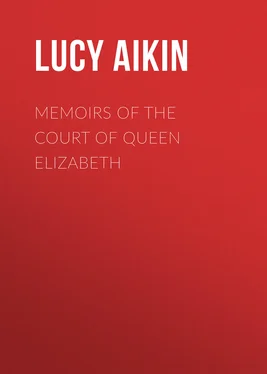Lucy Aikin - Memoirs of the Court of Queen Elizabeth
Здесь есть возможность читать онлайн «Lucy Aikin - Memoirs of the Court of Queen Elizabeth» — ознакомительный отрывок электронной книги совершенно бесплатно, а после прочтения отрывка купить полную версию. В некоторых случаях можно слушать аудио, скачать через торрент в формате fb2 и присутствует краткое содержание. Жанр: foreign_prose, История, foreign_edu, foreign_antique, на английском языке. Описание произведения, (предисловие) а так же отзывы посетителей доступны на портале библиотеки ЛибКат.
- Название:Memoirs of the Court of Queen Elizabeth
- Автор:
- Жанр:
- Год:неизвестен
- ISBN:нет данных
- Рейтинг книги:4 / 5. Голосов: 1
-
Избранное:Добавить в избранное
- Отзывы:
-
Ваша оценка:
- 80
- 1
- 2
- 3
- 4
- 5
Memoirs of the Court of Queen Elizabeth: краткое содержание, описание и аннотация
Предлагаем к чтению аннотацию, описание, краткое содержание или предисловие (зависит от того, что написал сам автор книги «Memoirs of the Court of Queen Elizabeth»). Если вы не нашли необходимую информацию о книге — напишите в комментариях, мы постараемся отыскать её.
Memoirs of the Court of Queen Elizabeth — читать онлайн ознакомительный отрывок
Ниже представлен текст книги, разбитый по страницам. Система сохранения места последней прочитанной страницы, позволяет с удобством читать онлайн бесплатно книгу «Memoirs of the Court of Queen Elizabeth», без необходимости каждый раз заново искать на чём Вы остановились. Поставьте закладку, и сможете в любой момент перейти на страницу, на которой закончили чтение.
Интервал:
Закладка:
Sir Thomas Pope was a man of worth and a gentleman; and such were the tenderness and discretion with which he exercised the delicate trust reposed in him, that the princess must soon have learned to regard him in the light of a real friend. It is not a little remarkable at the same time, that the person selected by Mary to receive so distinguished a proof of her confidence, should have made his first appearance in public life as the active assistant of Cromwel in the great work of the destruction of monasteries; and that from grants of abbey lands, which the queen esteemed it sacrilege to touch, he had derived the whole of that wealth of which he was now employing a considerable portion in the foundation of Trinity college Oxford.
But sir Thomas Pope, even in the execution of the arbitrary and rapacious mandates of Henry, had been advantageously distinguished amongst his colleagues by the qualities of mildness and integrity; and the circumstance of his having obtained a seat at the council-board of Mary from the very commencement of her reign, proves him to have acquired some peculiar merits in her eyes. Certain it is, however, that a furious zeal, whether real or pretended, for the Romish faith, was not amongst his courtly arts; for though strictly enjoined to watch over the due performance and attendance of mass in the family of the princess, he connived at her retaining about her person many servants who were earnest protestants.
This circumstance unfortunately reached the vigilant ears of Gardiner; and it was to a last expiring effort of his indefatigable malice that Elizabeth owed the mortification of seeing two gentlemen from the queen arrive at Lamer, a house in Hertfordshire which she then occupied, who carried away her favorite Mrs. Ashley and three of her maids of honor, and lodged them in the Tower.
Isabella Markham, afterwards the wife of that sir John Harrington whose sufferings in the princess's service have been already adverted to, was doubtless one of these unfortunate ladies. Elizabeth, highly to her honor, never dismissed from remembrance the claims of such as had been faithful to her in her adversity; she distinguished this worthy pair by many tokens of her royal favor; stood godfather to their son, and admitted him from his tenderest youth to a degree of affectionate intimacy little inferior to that in which she indulged the best beloved of her own relations.
In the beginning of September 1555 king Philip, mortified by the refusal of his coronation, in which the parliament with steady patriotism persisted; disappointed in his hopes of an heir; and disgusted by the fondness and the jealousy of a spouse devoid of every attraction personal and mental, quitted England for the continent, and deigned not to revisit it during a year and a half. Elizabeth might regret his absence, as depriving her of the personal attentions of a powerful protector; but late events had so firmly established her as next heir to the crown, that she was now perfectly secure against the recurrence of any attempt to degrade her from her proper station; and her reconciliation with the queen, whether cordial or not, obtained for her occasional admission to the courtly circle.
A few days after the king's departure we find it mentioned that "the queen's grace, the lady Elizabeth, and all the court, did fast from flesh to qualify them to take the Pope's jubilee and pardon granted to all out of his abundant clemency 27 27 Strype's Ecclesiastical Memorials.
;" a trait which makes it probable that Mary was now in the habit of exacting her sister's attendance at court, for the purpose of witnessing with her own eyes her punctual observance of the rites of that church to which she still believed her a reluctant conformist.
A few weeks afterwards, the death of her capital enemy, Gardiner, removed the worst of the ill instruments who had interposed to aggravate the suspicions of the queen, and there is reason to believe that the princess found in various ways the beneficial effects of this event.
CHAPTER VIII
Elizabeth applies herself to classical literature.—Its neglected state.—Progress of English poetry.—Account of Sackville and his works.—Plan of his Mirror for Magistrates.—Extracts.—Notice of the contributors to this collection.—Its popularity and literary merits.—Entertainment given to Elizabeth by sir Thomas Pope.—Dudley Ashton's attempt.—Elizabeth acknowledged innocent of his designs.—Her letter to the queen.—She returns to London—quits it in some disgrace after again refusing the duke of Savoy.—Violence of Philip respecting this match.—Mary protects her sister.—Festivities at Hatfield, Enfield, and Richmond.—King of Sweden's addresses to Elizabeth rejected.—Letter of sir T. Pope respecting her dislike of marriage.—Proceedings of the ecclesiastical commission.—Cruel treatment of sir John Cheke.—General decay of national prosperity.—Loss of Calais.—Death of Mary.
Notwithstanding the late fortunate change in her situation, Elizabeth must have entertained an anxious sense of its remaining difficulties, if not dangers; and the prudent circumspection of her character again, as in the latter years of her brother, dictated the expediency of shrouding herself in all the obscurity compatible with her rank and expectations. To literature, the never failing resource of its votaries, she turned again for solace and occupation; and claiming the assistance which Ascham was proud and happy to afford her, she resumed the diligent perusal of the Greek and Latin classics.
The concerns of the college of which sir Thomas Pope was the founder likewise engaged a portion of her thoughts; and this gentleman, in a letter to a friend, mentions that the lady Elizabeth, whom he served, and who was "not only gracious but right learned," often asked him of the course which he had devised for his scholars.
Classical literature was now daily declining from the eminence on which the two preceding sovereigns had labored to place it. The destruction of monastic institutions, and the dispersion of libraries, with the impoverishment of public schools and colleges through the rapacity of Edward's courtiers, had inflicted far deeper injury on the cause of learning than the studious example of the young monarch and his chosen companions was able to compensate. The persecuting spirit of Mary, by driving into exile or suspending from the exercise of their functions the able and enlightened professors of the protestant doctrine, had robbed the church and the universities of their brightest luminaries; and it was not under the auspices of her fierce and ignorant bigotry that the cultivators of the elegant and humanizing arts would seek encouragement or protection. Gardiner indeed, where particular prejudices did not interfere, was inclined to favor the learned; and Ascham owed to him the place of Latin secretary. Cardinal Pole also, himself a scholar, was desirous to support, as much as present circumstances would permit, his ancient character of a patron of scholars, and he earnestly pleaded with sir Thomas Pope to provide for the teaching of Greek as well as Latin in his college; but sir Thomas persisted in his opinion that a Latin professorship was sufficient, considering the general decay of erudition in the country, which had caused an almost total cessation of the study of the Greek language.
It was in the department of English poetry alone that any perceptible advance was effected or prepared during this deplorable æra; and it was to the vigorous genius of one man, whose vivid personifications of abstract beings were then quite unrivalled, and have since been rarely excelled in our language, and whose clear, copious, and forcible style of poetic narrative interested all readers, and inspired a whole school of writers who worked upon his model, that this advance is chiefly to be attributed. This benefactor to our literature was Thomas Sackville, son of sir Richard Sackville, an eminent member of queen Mary's council, and second-cousin to the lady Elizabeth by his paternal grandmother, who was a Boleyn. The time of his birth is doubtful, some placing it in 1536, others as early as 1527. He studied first at Oxford and afterwards at Cambridge, distinguishing himself at both universities by the vivacity of his parts and the excellence of his compositions both in verse and prose. According to the custom of that age, which required that an English gentleman should acquaint himself intimately with the laws of his country before he took a seat amongst her legislators, he next entered himself of the Inner Temple, and about the last year of Mary's reign he served in parliament. But at this early period of life poetry had more charms for Sackville than law or politics; and following the bent of his genius, he first produced "Gorboduc," confessedly the earliest specimen of regular tragedy in our language; but which will be noticed with more propriety when we reach the period of its representation before queen Elizabeth. He then, about the year 1557 as is supposed, laid the plan of an extensive work to be called "A Mirror for Magistrates;" of which the design is thus unfolded in a highly poetical "Induction."
Читать дальшеИнтервал:
Закладка:
Похожие книги на «Memoirs of the Court of Queen Elizabeth»
Представляем Вашему вниманию похожие книги на «Memoirs of the Court of Queen Elizabeth» списком для выбора. Мы отобрали схожую по названию и смыслу литературу в надежде предоставить читателям больше вариантов отыскать новые, интересные, ещё непрочитанные произведения.
Обсуждение, отзывы о книге «Memoirs of the Court of Queen Elizabeth» и просто собственные мнения читателей. Оставьте ваши комментарии, напишите, что Вы думаете о произведении, его смысле или главных героях. Укажите что конкретно понравилось, а что нет, и почему Вы так считаете.












